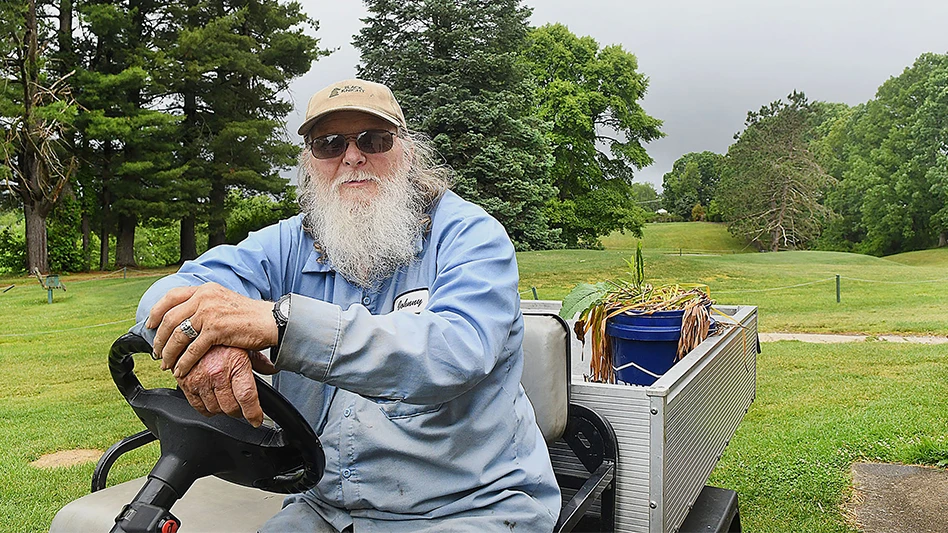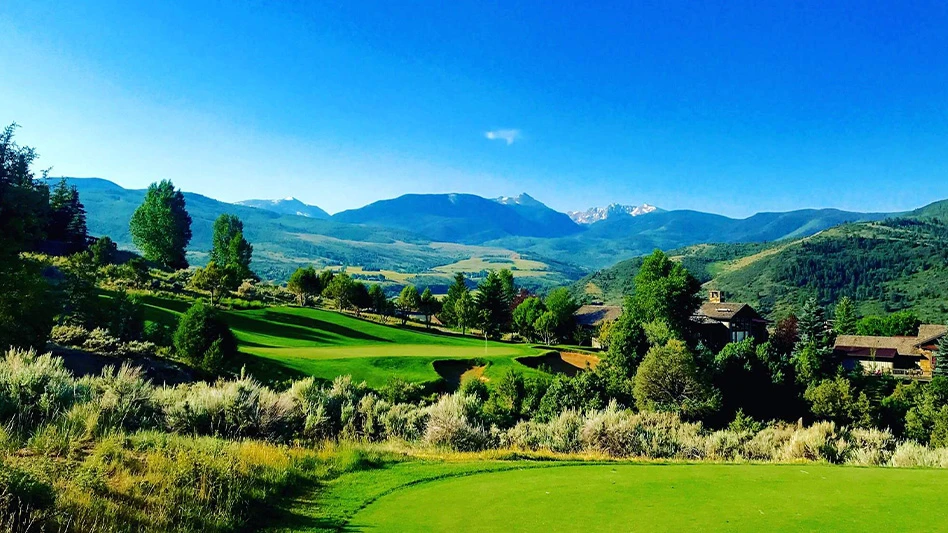

Johnny Kincaid has been working at the Historic Black Knight Golf Course in Beckley, West Virginia, for 50 years. He carries stories and memories. He has observed changes to the course. Even at age 68, Kincaid has no plans of retiring from his job as superintendent.
Historic Black Knight opened in 1929. The Fred Findlay-designed course sits on a 67-acre property once owned by Raleigh Coal & Coke. The “Black Knight” originated from the trademark of the coal company, which had a large presence in southern West Virginia.
Raleigh owned the course until 1950. The company halted operations and, in 1951, members bought the course, owning it all the way up until 2011 when current West Virginia Governor Jim Justice bought the course. In May of 2018, the City of Beckley purchased the course and for the first time in the its history, it became a public facility.
Kincaid joined the Black Knight team when he was 18, but it wasn’t his first job. At 16, Kincaid worked as a horse boy. Three months later, he became a mechanic, working at two different shops until he arrived at the course. He discovered he didn’t “like being inside. I can’t handle working inside.”
He started as an hourly worker on the crew. “They gave me a lawn mower and a gallon of gas and then pointed towards the trees,” Kincaid says. He moved on to bunker maintenance, raking the sand. “Then they found out I could work on the equipment,” he says.
After his boss passed away, Kincaid took over as superintendent in the late 1970s — although Kincaid prefers the title groundskeeper. “I’d been working with him,” Kincaid says. “I knew how to use the spray chemicals and everything, what to use and what to watch for.”
Kincaid was sent to different schools, including Virginia Technical Institute. He also went to several classes, some conducted by Jacobsen that required him to answer questions and demonstrate how to handle various equipment. Kincaid made the most of the opportunities, asking questions and talking with members.
Kincaid is a self-taught superintendent. His ability to learn through observing helped him grow professionally.
“In the morning, I could watch the dew,” he says. “If you see light spots, you know you’re getting a hotspot there. You watch how everything is doing, the different colors of the grass and everything.”
To keep the course in good shape, Kincaid talked to plant protectant sales representatives. He now uses plant growth regulators on the tees, fairways and greens. “It helps here so we don’t have to cut them every day,” he says.
Kincaid also talked with members to learn new things. “We had one witness exterminating. I talked to him quite a bit, he was a member,” Kincaid says. “He said when the ground turns yellow, it’s time to put out the pre-emergent, which is right, it makes sense.”
What really made Kincaid so valuable to the club was his ability to fix things, or as Micah Davis, director of golf at Historic Black Knight, described it, Kincaid’s ability to “make things from nothing.”
“There’d be times I would speak to Johnny when it was private, and he’d say ‘Well, this broke today,’” Davis says. “And then I’d say, ‘Oh, goodness. Well, what are our options?’ And he’s like, ‘Don’t worry, I’ve already fixed it.’ I was like, ‘What do you mean? That was rather substantial.’ And he goes, ‘No, I had an old barbell on hand and I gutted it and welded it, and it’s fixed.’”
It was part of the value he brought to the job, as Davis described Kincaid as taking “one stood of peanut butter and three sandwiches.” His talent to fix things is how Kincaid climbed his way up. “They usually laid the summer help off during the winter, but they found out I could work on equipment,” Kincaid says. “So, they kept me on for several years.”
For 89 years, Black Knight was a members-only course. When the city bought the course, Kincaid was part of the deal. Leslie Baker, director of Parks and Recreation in Beckley, asked if Kincaid would like to stay on. He replied, “I would if I could.”
The decision to keep Kincaid on was not a hard one for Baker. Not knowing a lot about golf or the course, Kincaid’s experience and years of work was valuable. “He knows every inch of that course,” Baker says. “He was there when they laid the irrigation system. He was there when some of the trees were small and were planted. He knew the history. He knows the wet spots, the problem areas, and that was going to be the guy that we’re going to need to help bring that course back to its former glory.”
Not only did Kincaid decide to stay on and not retire, but he has turned down other job offers. “He has been offered jobs at other properties, making more money, doing different things,” Davis says. “Some of these jobs he’s been offered are doing the exact same thing, which would be a very easy, very lateral move on his part. But he likes where he is, likes doing what he’s doing. He’s comfortable there.
“But at this, he’s watched it grow, he’s watched it develop. He likes being part of this particular property, getting better and getting healthier and getting more notoriety. He likes being a part of that property. So, it’s not just him succeeding, he likes to see the property succeed.”
When the city took over the course, it was strange for Kincaid as he had to get used to some things. “If it’s on the calendar, they get the day off. To me, that’s crazy,” Kincaid says. “Holidays is when you normally have your most business. They’re closed on holidays. It’s not right. But they turned it completely public, which I still have all the old members still come out and play. They stop and talk to me every time.”
Kincaid had been fixing things for the majority of his life. Back when the course was private, “He did some side gigs where he would work on people’s cars here and there,” Davis says. “He always stated under the premise that he was going to make a couple extra dollars but then he usually ended up not charging anybody more often than not because he really genuinely just liked to help.”
But after the city purchased the course, there wasn’t as much of a need for repair work. “If we needed something, they usually get it for us. Need a piece of equipment, they’ll find some way to get it,” Kincaid says. It took some getting used to for Kincaid.
“Now, I’ve actually had to retrain in a sense,” Davis says. “I had to break him of his old habits. He used to keep everything because he had to keep everything and now it’s more like, We can get rid of something because now we can afford to replace. He’s just like, ‘I hate to throw it away,’ and I’m like, ‘I know, I know how it is, I was right there with you.’ Now space becomes more of a value.”

Baker noticed a similar thriftiness in Kincaid, who has been helped by the city investing more than $100,000 in equipment for the course.
“One of the first things I asked him was for an inventory and what he needed the most,” she says, “and I think that he had never had that kind of opportunity to say I need this, this, this, and this.”
Although it was a change for Kincaid, Beckley has been very good to him. “I was off because I had a heart attack,” he says. “They paid all my deductibles on my insurance. They kept my job position open, so when the doctor released me I came back to the same job I had.”
Before, Kincaid didn’t have any health insurance, and “we have really good health insurance at the city,” Baker says. Even before the heart attack, the city assisted Kincaid with his health.
“Micah and I kind of worked together to figure out a way where Micah could say, ‘You need to go now, you need to get your diabetic medication,’” Baker says. “And as we saw him progress and do better and get his medicine, and then we have a wonderful HR department that works with you too, if you have any questions, and she would call him and talk to him and reassure him that he wasn’t going to get a lot of bills.”
Kincaid described the course as home and family. Kincaid even used to live on the course. “There were two houses on property, one for the golf pro and one for the greenskeeper, then the third floor of the clubhouse there was an apartment for the general manager, an apartment for the executive chef,” Davis says. “So, Johnny lived on that property for years as well. And actually, his oldest son was born in the old house that still sits there.”
Kincaid even planted a pine tree in the house’s front yard, now adjacent to the maintenance building. “That tree belongs to him,” Davis says. “Living and working on the course for so long, Kincaid knows the ins and outs.”
“They always had what they call a program and invitation, which was the two big tournaments every year,” Kincaid says. “(Former Black Knight pro) Billy (Capps) always had me place the pin placements. It wasn’t easy, nobody birdies. I enjoyed that.”
Like many longtime superintendents, Kincaid has spots on the course he returns to again and again. “Couple spots are in my favorite list. One is roughly between 3 and 8, where it runs, basically in the middle of the course,” Kincaid says. “There are no houses nowhere close, and in the evening when the sun’s gone down and you got the sun setting and everything, it’s nice. In the fall, when all the trees are all changing, it’s one of my favorite places.”
Kincaid originally intended to retire and travel with his second wife, Janet. But after she passed, Kincaid says he “has no reasons” to retire. “I’d like to keep going as long as I can,” he says. Kincaid adds he has “a lot of memories. A lot of good ones, some bad ones, but that’s life. I’ve just enjoyed being there.”

Explore the September 2023 Issue
Check out more from this issue and find your next story to read.
Latest from Golf Course Industry
- USGA focuses on inclusion, sustainability in 2024
- Greens with Envy 65: Carolina on our mind
- Five Iron Golf expands into Minnesota
- Global sports group 54 invests in Turfgrass
- Hawaii's Mauna Kea Golf Course announces reopening
- Georgia GCSA honors superintendent of the year
- Reel Turf Techs: Alex Tessman
- Advanced Turf Solutions acquires Atlantic Golf and Turf





